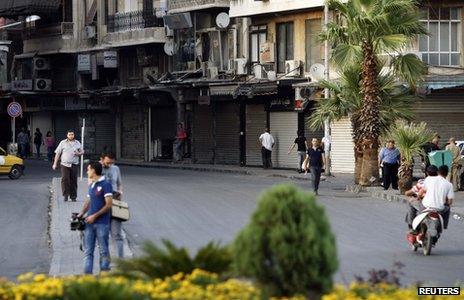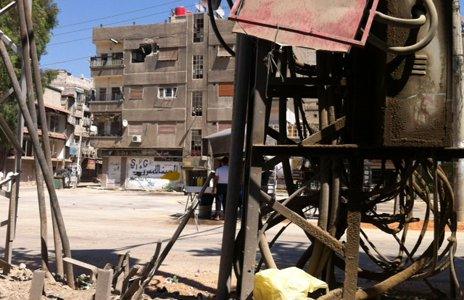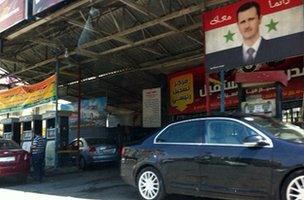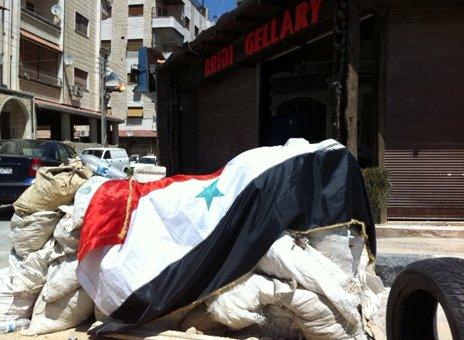Syria's minorities drawn into conflict
- Published

Christian leaders in Bab Touma do not want people to take up arms
As the fighting in Syria intensifies and grows more sectarian in nature, a journalist in Damascus tells how the country's many ethnic and religious minorities are being drawn into the conflict.
One evening in Bab Touma, a Christian area in the Old City of Damascus, Abu George had to wait all night at the front door of his house waiting for his son to come back.
"It was a crazy night. There was a lot of shooting going on in the area," the 60 year old says. "My son went out, as he wanted to join the fight. He is a teenager and I can't control him."
Over the past few weeks, there has been rising concern within the capital's Christian community about its young men joining the fight against President Bashar al-Assad's opponents.
"The young, unemployed Christians in Damascus responded to regime appeals to take up arms to defend themselves," says a local priest.
"They were told Salafists were coming to kill them," a reference to ultraconservative Sunni Islamists who are a growing influence on Syria's uprising.
"The regime is trying to inflame sectarianism and get the Christians involved in the battle."
'Abusing power'
The young Christians were urged to join what the government has named "Popular Committees", which are tasked with protecting neighbourhoods from attack. To many, however, they are just groups of pro-government thugs.
Some Popular Committees - like those in Bab Touma and the neighbouring Christian area of Bab Sharqi - have even agreed to be armed.
Most Christians, who make up about 10% of Syria's population, have sought to avoid being drawn into their country's increasingly sectarian conflict, which has seen the majority Sunni community bear the brunt of the crackdown from security forces led by Alawites, members of a heterodox Shia sect to which Mr Assad belongs.
"This is an act to show power and abuse power," the priest says.

Fighting has spread throughout Damascus in the past two months
"But we are working hard to raise awareness among Christians to avoid getting involved in the conflict, and many people have refused to take up arms."
Some Christian opposition activists have reached out to members of the rebel Free Syrian Army (FSA), and both have tried to reassure the community that they will not be targeted.
'One people'
In one of the suburbs of Damascus, al-Montasir Billah Omar, a spokesman for the FSA's al-Baraa bin Malik Brigade, met representatives of other rebel formations to write a joint statement warning local Christians not to take up arms.
"We call on our brothers in Syria to maintain the social mosaic that distinguishes the country," urged the statement, which was signed by the Military Council for the Syrian Revolution in the Suburbs of Damascus, and other FSA brigades.
"We assure the people of our country that our slogan is: 'We are all one people of one country.'"
Mr Omar, a father of two in his early 30s, is a leading figure in the FSA.
"Our fight is not against any of the minorities in Syria, not even the Alawites, but with the Assad regime," he says.
He adds that if it were a sectarian conflict, FSA fighters could have launched raids on Alawite villages in retaliation for the deaths of Sunnis, but that they had not.
"It is the regime that is bombarding cities and killing us, but we will not take revenge."
As the FSA representatives were meeting to discuss the statement, a shipment of food arrived which was due to be distributed to internally displaced people.
"These food supplies are sent to us by Christians and Alawites families. Our war is against Assad not his sect," Mr Omar says.
'Criminals'
Jaramana is a little town located to the south-east of Damascus, home to many secular young Syrians from various Muslim sects, but whose population is predominantly Druze.

The residents of Jaramana have grown increasingly unconformable with the crackdown on dissent
The Druze, who make up 4% to 5% of the population, follow a monotheistic religion drawn on Ismailism, a branch of Shia Islam, and like Syria's Christians initially tried to avoid taking sides in the uprising.
The Syrian government has also made efforts to prevent protests taking place in Jaramana.
Nadia, a Druze journalist who has lived all her life in Jaramana, says every demonstration was suppressed and opposition supporters were reported to the security services to help the government keep Jaramana quiet.
But that was not the case when Shabiha, a term used to describe pro-government thugs, started to get armed in the town, Nadia says.
"The security people recruited all the convicted criminals in prison, released them under an amnesty and armed them under the pretext of protecting the area from armed Salafist gangs," she adds.
Looking east from the balcony of her small flat, Nadia points to a helicopter firing on another district of Damascus, from where black smoke is rising.
"When the violence intensified in towns surrounding Jaramana, there was a large number of displaced people running here to seek shelter. Almost everyone in town wanted to help, including people who are loyalists to the regime," she says.
'Divide and rule'
Then two weeks ago, rumours started to emerge about a series of assassinations in Jaramana.

Checkpoints have been set up by pro-government militiamen in Jaramana
A few members of the Popular Committee, who locals described as Shabiha or criminals, were killed.
Some blamed Free Syrian Army fighters from neighbouring towns, but others suspected people in Jaramana. The Popular Committee, they said, had become a gang that was forcing people to pay protection money.
But Nadia says the incident that truly united everyone - and prompted Druze religious leaders to issue statements of condemnation - was the public killing of a rebel fighter in a central square in Jaramana by Popular Committee members, who then drove his body around the town to intimidate people.
They also went to schools where many displaced people were sheltering and accused them of being terrorists. Nadia says Jaramana's residents rejected this, and that local clerics called on people to remain rational and united.
Nadia says she cannot accept being stopped and searched in her own town by criminals, who are operating under the guise of providing protection.
"This is unbearable, why should I accept it?" she asks. "The regime is doing everything it can to divide and rule, but luckily there are still wise people around."